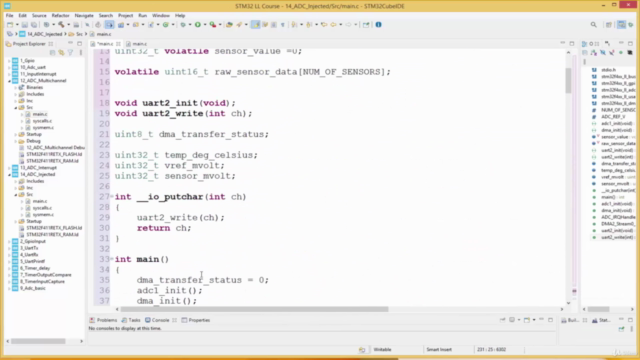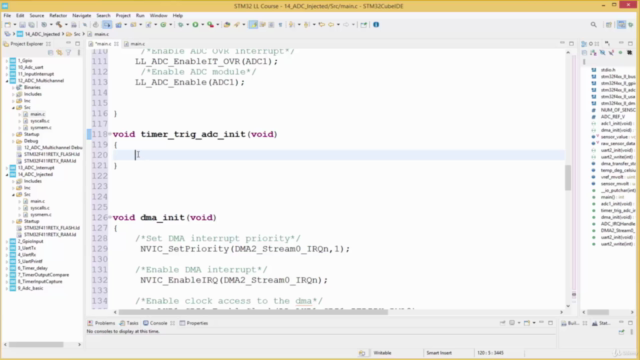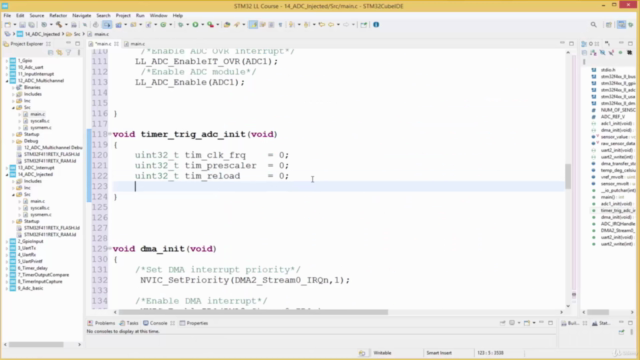Embedded Systems STM32 Low-Layer APIs(LL) Driver Development

Why take this course?
🌟 Embedded Systems STM32 Low-Layer (LL) Drivers: A Deep Dive into Hardware-Close Programming 🌟
Course Overview:
Welcome to the Embedded Systems STM32 Low-Layer APIs(LL) Driver Development course! Embark on a journey to master the intricacies of embedded systems development with the powerful STM32 microcontrollers. This comprehensive course is tailored for engineers and developers who aspire to gain an in-depth understanding of peripheral driver development using the STM32 Low-Layer APIs.
What You'll Learn:
The STM32 Low-Layer APIs (LL) offer a fast, light-weight, and expert-oriented layer that operates closer to the hardware than the HAL (Hardware Abstraction Layer) APIs. This course will guide you through the low-level APIs at the register level, providing the knowledge and skills necessary to interact directly with the microcontroller's peripherals.
Key Components of the Course:
- Firmware Development: Learn to navigate the microcontroller reference manual and datasheet to extract vital information for building professional peripheral drivers and firmware.
- Peripheral Drivers: Develop drivers for a wide range of STM32 peripherals, including ADC, UART, PWM, GPIO, TIMER, I2C, SPI, RTC, WWDG, IWDG, RCC, EXTI, and more.
- STM32 Architecture: Master the architecture of STM32 microcontrollers to build robust embedded firmware.
Course Structure:
- Introduction to LL APIs: Understanding the basics and why LL APIs are preferred over HAL for certain applications.
- Peripheral Clocking with RCC: Learn how to control clocks for various peripherals to optimize performance and power consumption.
- ADC: Analog-to-Digital Conversion: Write ADC drivers using LL functions, including configuration, sampling, and reading analog values.
- PWM: Pulse Width Modulation: Implement PWM drivers using LL functions for a variety of applications like motor control and LED dimming.
- UART: Serial Communication: Develop UART drivers using LL functions for reliable serial data transmission and reception.
- TIMERS: Timing and Event Management: Write TIMER drivers using LL functions to manage time-based operations, debouncing, and more.
- Interrupt Handling: Implement interrupt drivers using LL functions for efficient event processing.
- SPI: Serial Peripheral Interface: Create SPI drivers using LL functions for high-speed data transfer between devices.
- I2C: Inter-Integrated Circuit (IIC) Communication: Develop I2C drivers using LL functions to communicate with I2C devices.
- RTC: Real-Time Clock: Write RTC drivers using LL functions for timekeeping and scheduling in embedded systems.
- DMA: Direct Memory Access: Understand and use DMA drivers using LL functions for efficient data transfers without CPU intervention.
- WWDG & IWDG: Watchdog Timers: Implement WWDG and IWDG drivers using LL functions to protect against system misoperation.
- RCC: Reset and Clock Control: Learn to manage resets and clock configurations for various peripherals in the STM32 microcontroller.
Course Benefits:
- Practical Skills: Transition from theory to practice with hands-on exercises that reinforce your learning.
- Real-World Application: Apply what you learn to real-world projects, enhancing your portfolio and skill set.
- Expert Support: Get access to a community of like-minded professionals and the guidance of experienced instructors.
Why Choose This Course?
- In-Depth Coverage: This course doesn't just scratch the surface; it dives deep into the mechanics of STM32 LL APIs, ensuring you have a thorough understanding of driver development.
- Flexible Learning: With flexible learning modules, you can learn at your own pace and on your own schedule.
- Money-Back Guarantee: Your satisfaction is our priority. We offer a 30-day money-back guarantee if you're not completely satisfied with the course.
Ready to Master STM32 Low-Layer APIs?
Sign up now and start your journey towards becoming an embedded systems expert. With this course, you'll gain the confidence and skills to navigate complex hardware abstractions and develop high-quality firmware for STM32 microcontrollers. Let's embark on this transformative learning experience together!
Course Gallery




Loading charts...